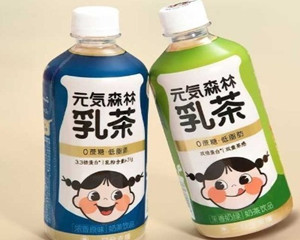(单词翻译:单击)
China beverage brand Genki Forest apologized Saturday for deceptively advertising its products as having no sugar.
4月10日,国内饮料品牌元气森林就其产品不含糖的虚假广告发表致歉声明。
In an apology statement, the fast-growing company said that the difference between "sugar-free" and "sucrose-free" was not well explained in the product promotion and packaging, leading to a "misunderstanding".
这家快速发展的公司在致歉声明中表示,没有在产品推广和包装上说明“无糖”和“无蔗糖”的区别,引发了“误解”。
Genki Forest promised to replace the packaging claim of “sucrose-free” with “low sugar” on some of its milk tea produced since Feb 4 and all milk tea produced since Mar 18.
元气森林承诺,从2月4日起生产的大部分乳茶和3月18日起生产的全部乳茶,包装从原来的“0蔗糖”改为“低糖”。
Artificially-sweetened beverages (ASBs) are alternatives to full-sugared drinks. They contain no sugar and are sweetened with artificial sweeteners instead. ASBs are often known as 'diet' versions of soft drinks, and may be perceived by consumers as the healthier option for those who want to lose weight or reduce their sugar intake.
人造甜味剂饮料(ASBs)是全糖饮料的替代品。这类饮料不含糖,由人造甜味剂来增甜,通常被称为“减肥”版软饮料。对于那些想要减重或减少糖分摄入的人来说,这种饮料对他们来说可能是更健康的选择。
Despite having no or very little energy content, there is a concern that ASBs might trigger compensatory food intake by stimulating sweet taste receptors. This, together with the consumers’ awareness of the low-calorie content of ASBs, may result in overconsumption of other foods, thus contributing to obesity, type 2 diabetes and other obesity-related health problems.
尽管人造甜味剂饮料的几乎没有热量或热量非常低,仍有人担心这类饮料可能会通过刺激甜味受体来引导补偿性食物的摄入。再加上消费者觉得这种饮料热量低,所以可能会过度摄入其他食物,从而导致肥胖、第二型糖尿病和其他与肥胖相关的健康问题的出现。

cane sugar
蔗糖
glucose
葡萄糖
frutose
果糖
lactose
乳糖
raw sugar
原糖
brown sugar
红糖
maple syrup
枫糖浆
sugar substitutes
代糖


